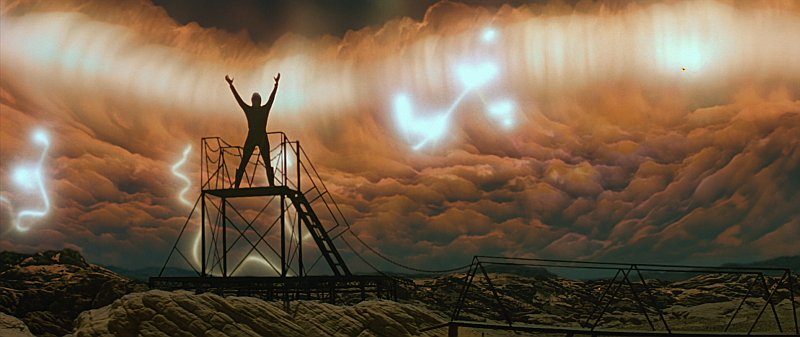In Defence of… Star Trek: Generations (1994).
In what’s becoming a regular feature on Film ’89, we take another look at a maligned and/or misunderstood film that may not have received the credit it deserves and may be worthy of a second chance. In our third entry in the series, and to coincide with the both the 30th Anniversary of Star Trek: The Next Generation and the release of the new show, Star Trek: Discovery, we take a look back at the 1994 film, Star Trek: Generations.
“They say time is the fire in which we burn.”
That one line of dialogue, delivered with such gravity by Malcolm McDowell’s Dr Tolian Soran in Star Trek: Generations could well describe the narrative through-line that defines the entire film, and as I’ll aim to illustrate, makes the oft-maligned 7th film in the series one of the most effective Star Trek films of them all.
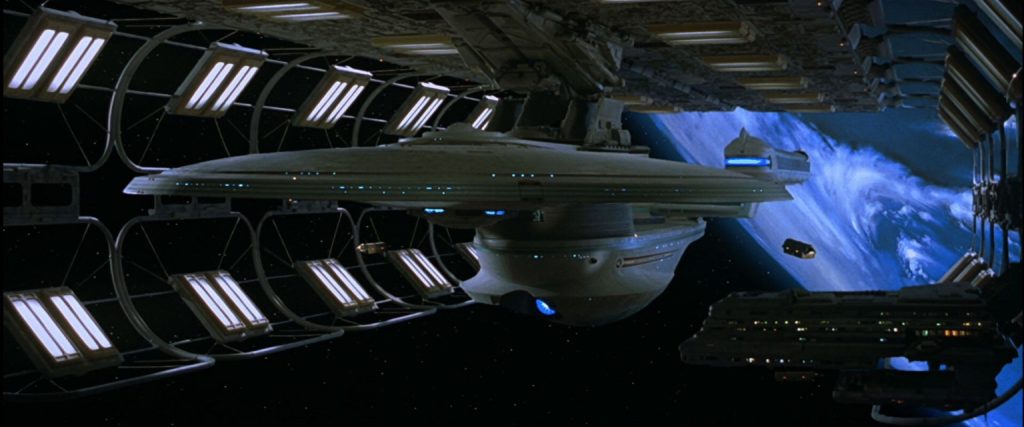
Star Trek, when it’s at its best and following the intentions of its creator, the late Gene Roddenberry, has always been a study of the human condition. Yes, the alien locales and sometimes fantastical situations form the surface gloss of the show but beneath it’s basic conceit, Star Trek has always provided a commentary on our society as it was back in the mid to late ‘60s when it first aired and how it is now. This isn’t a galaxy far, far away, it’s us, on Earth. It’s our society but reflected in a mirror that distorts those things somewhat by adding in a strong science fiction element. Whether commenting on racial issues, as the original series often did, or socio-political matters, Star Trek has often been the soundbox through which any number of writers have aired their views on matters that affect us now, in our time and not hundreds of years in the future.
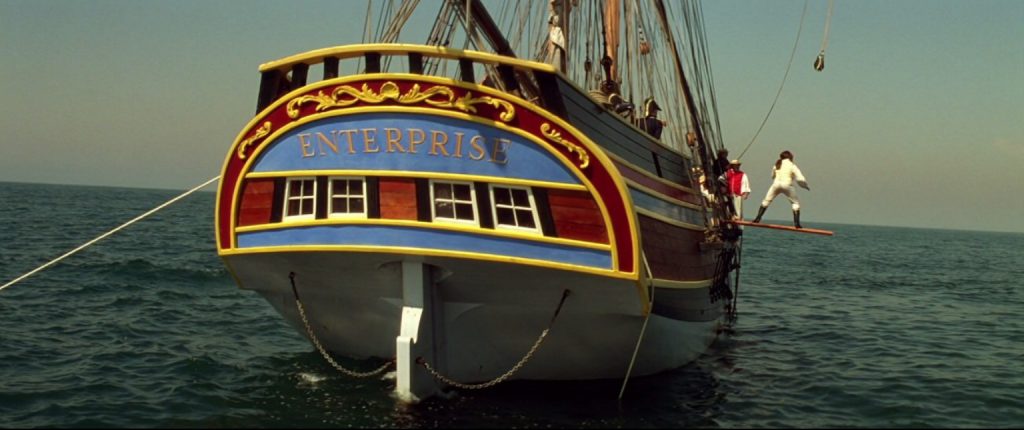
The seventh Star Trek film came to screens in 1994, three years after the original series’ crew had been given a fitting send off in Star Trek VI: The Undiscovered Country. The seven year run of The Next Generation also came to an end in 1994 and the pressure was on for Paramount to get the Next Generation crew to the big screen. The short pre-production period meant that sets from the TV show had to be reused and whilst this meant that the scope for continuity with the Enterprise interior would be maintained, they were never built with the wider aspect ratio and the higher definition of 35mm film in mind. The the late John A. Alonzo, the acclaimed director of photography whose work included Chinatown, made the most of what he had and shot the made-for-TV sets in ways that would hide their more humble origins. Avoiding the use of harsh and stark lighting, Alonzo bathed the Enterprise-D sets early on in the film in an orange glow from the nearby Amargosa star, giving the film a beautiful, magic-hour look. There’s hardly a single shot in the film that looks anything less than gorgeous. Alonzo really was a master of his art and the film looks uniformly stunning throughout.
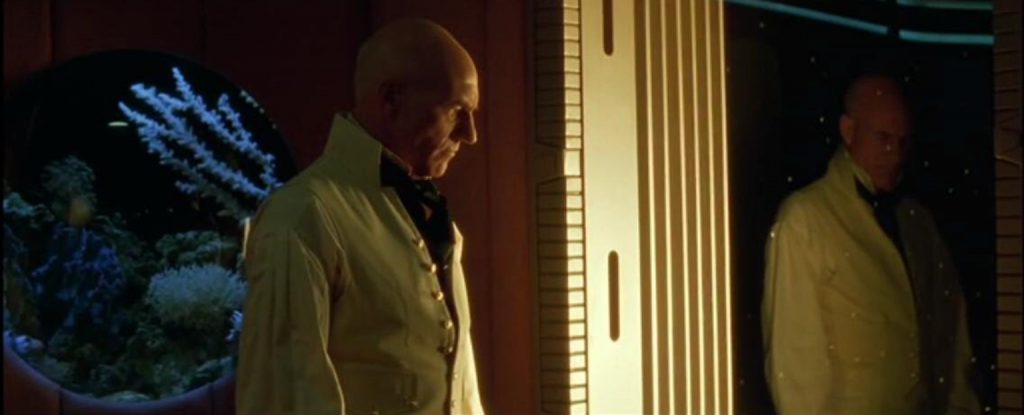
Paramount gave directing duties on their first TNG film to David Carson who had directed episodes of the TV show. In my humble opinion, Carson does a fine job and the end product, coupled with Alonzo’s camerawork, certainly looks just like a big budget version of The Next Generation should. Carson delivered the film on time and under budget, even taking into account a costly reshoot of the original ending. The effects on the whole are superb and still hold up today. The destruction of the Enterprise-D was wholly necessary as the design and models were over seven years old by this point, having been made for TV and it would make way for the far sleeker looking Enterprise-E in the following film two years later. The destruction of the Enterprise-D is also far better executed than the similar scene in 2016’s Star Trek: Beyond, with an effective mix of CG and practical models.
Now given that this piece is part of our ‘In Defence of…’ series, I’ll address the elephant in the room before I’m accused of any possible lack of objectivity. Star Trek: Generations, going by its current ranking on IMBD, is only the joint 8th highest rated of the 13 Star Trek films alongside Star Trek III: The Search for Spock. It’s far from being one of the more heavily lambasted films in the series, but neither is it held in very high regard amongst the majority of fans, and has more than its fair share of detractors. I’ll accept that there are issues with Generations‘ script in certain areas and many have cited the rushed pre-production as a cause of this. However, I’ll make it clear that the reason I’m even bothering to write about a Trek film that few would say was the best is because for me personally, Star Trek: Generations is not only the most underrated film in the series, but one of the most misunderstood and under-appreciated films I’ve seen period.
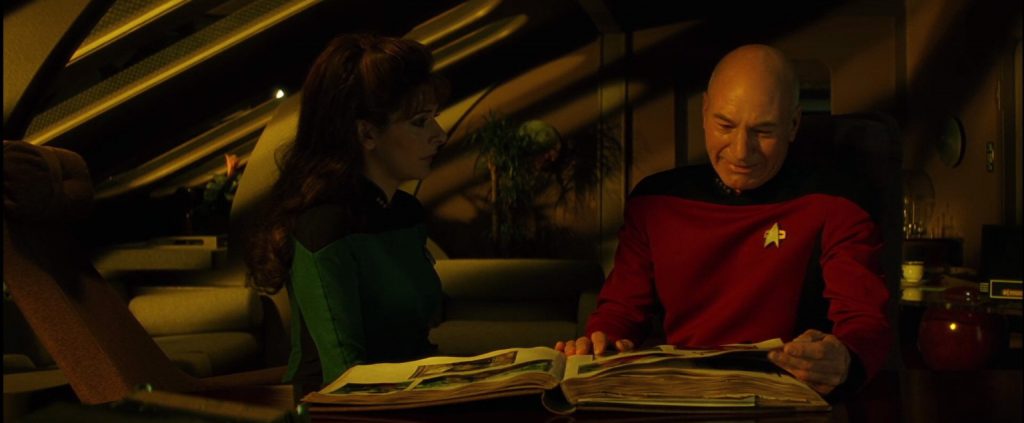
I will concede that certain plot aspects and early scenes are somewhat redundant and this is mostly concerning the early scene on the Holodeck where Worf is promoted to Lt. Commander, which in turn leads into the sub-plot involving Data’s newly implanted emotion chip. The Holodeck scene has a certain goofiness to it and a light and fluffy air that is in jarring contrast to the generally profound treatise on time and mortality that forms the bulk of the film’s plot. The Data emotion chip sub-plot was a leftover from the series and needn’t have been carried over into Generations, especially as it gets unceremoniously dumped in later TNG films. That said, both the Holodeck scene and the Data sub-plot do work in some respects. The Holodeck tomfoolery nicely sets up the fall into emotional despair that Picard will soon suffer and seeing him later on, mourning the death of his nephew whilst still wearing the regal seafaring attire does give those scenes a certain tragic heft. The conflict Data has in struggling to deal with the flood of newfound emotions also holds some worth later on in the film in that what he’s going through nicely parallels Picard’s own struggles with the emotional turmoil caused by the death of his brother and beloved nephew.
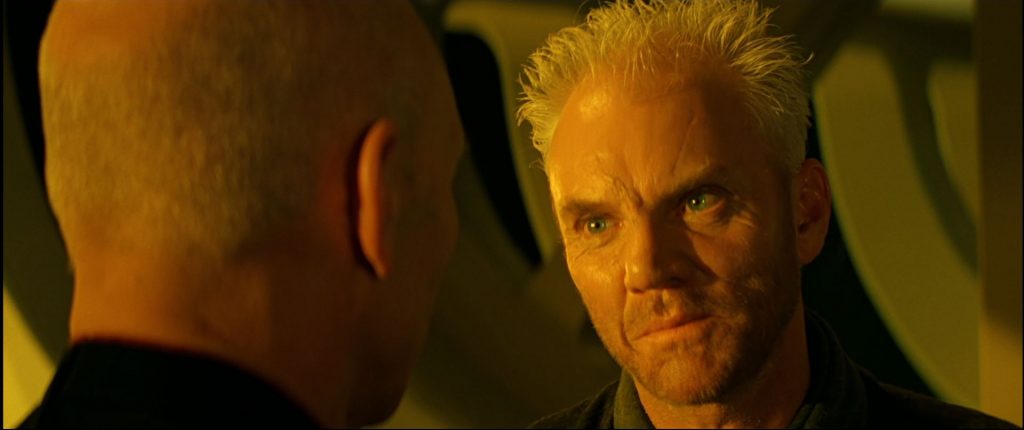
The bereavement that Picard goes through also ties in nicely with the film’s main themes of life, death and mortality, and Patrick Stewart’s performance in these scenes, and the film throughout, is superb. His delivery of his lines on the bridge of the Enterprise as he instructs Riker to take command is full of nuance and strained composure as he tries to hold himself together. This is again displayed in the visually stunning scene in Stellar Cartography as Picard loses his patience with a guilt-racked Data before reigning in his emotions once more to give Data words of comfort and support.
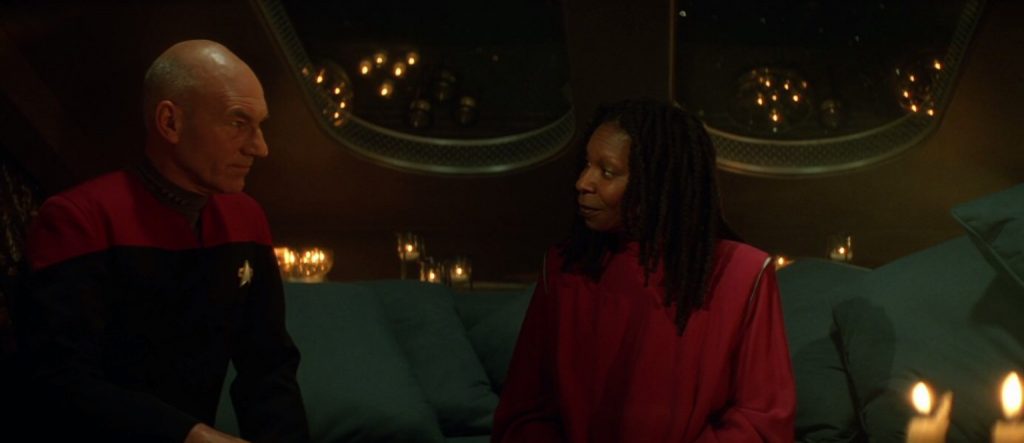
The film has been criticised for its apparent shoehorning in of three of the original series crew, with Scotty and Chekov in the opening scene and James T. Kirk returning for the final act and has been accused of purposely having both the outgoing and current captains in the same film as a way of passing the torch and pleasing fans. But I see nothing wrong with the way in which this is implemented. The early scenes on the Enterprise-B work in terms of the narrative as they set up the El-Aurian’s “rescue” from the Nexus and Kirk’s apparent sacrifice. When he’s later introduced, 78 years later in Picard’s era, it again works perfectly within the confines of the narrative. The connective tissue that both allows the coming together of the two captains and the subsequent resurrection of Kirk is the Nexus.
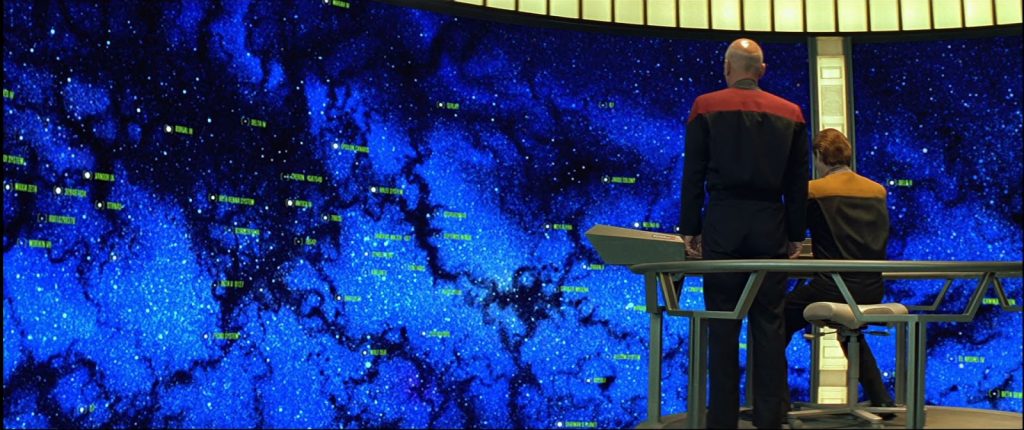
The main plot device in Generations, the Nexus, is a giant energy ribbon that travels through our galaxy every 39 and a bit years and anyone who gets caught up in it effectively leaves the space-time continuum as we know it and enters a realm where their every desire comes to vivid life and where “time has no meaning”. Star Trek has frequently toyed with themes of religion, deities and such like and it’s quite clear that the Nexus is Trek’s attempt to scientifically (science-fictionally?) explain the afterlife or Heaven in real terms. As time has no meaning there, those who enter the Nexus never grow old and never die and as your every wish comes true this is clearly analogous to the generally accepted idea of an afterlife.
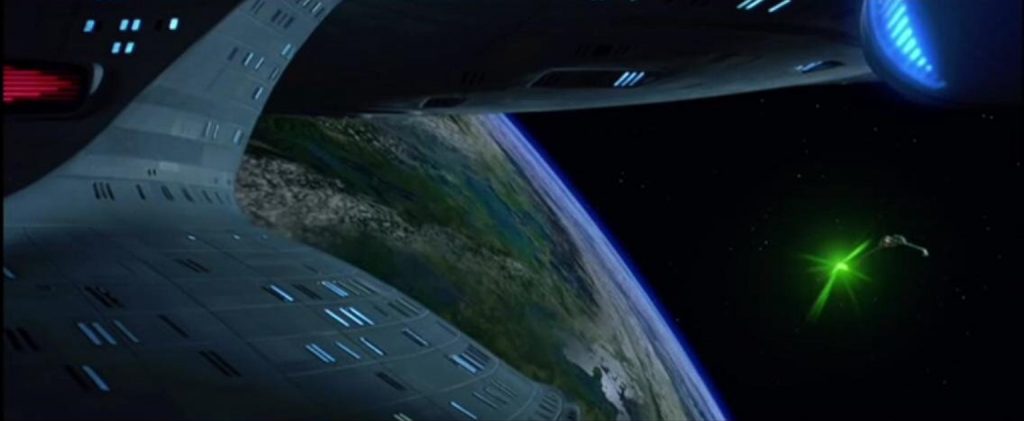
What the Nexus provides the plot is a driving motivation for the film’s antagonist, Soran to get back there by any means and no matter the cost in innocent lives. Soran was once a good man but since being torn from the Nexus back into our reality he’s been obsessed with getting back there for nearly 80 years. Whereas fellow El-Aurian refugee, Guinan who was also “rescued” along with Soran, was able to put it behind her, Soran wasn’t, due no doubt to the fact that his entire family was wiped out by the Borg and in the Nexus he’d get to be with them once more. Such a strong motivation gives the character of Soran so much more depth than if he’d just been written as “evil”. Coupled with a suitably restrained performance from Malcolm McDowell, Soran is one of Trek’s very finest villains. His icy cool dialogue in his exchanges with Picard where they discuss time and mortality are superbly written as is most of the dialogue throughout when the film is dealing with the main storyline. I’ll concede that this doesn’t always apply to the lighter, fluffier Data subplot scenes.

For me there are so many scenes where the dialogue just shines and really shows that there’s an intelligence and layered depth to Generations‘ script and this is bolstered by the nuanced performances of Stewart, McDowell and Whoopi Goldberg. No scene demonstrates this better than the scene in Ten Forward, the Enterprise’s bar/lounge area. The initial exchange between Picard and Soran is brief but wholly memorable and the silent acknowledgement that follows between Soran and Guinan where Soran recognises her and she in turn hides the fact that she’s also recognised him until he’s turned away from her is so well played. Later on when Guinan describes the Nexus to Picard, telling him that if he enters it he won’t care about anything else and won’t want to leave, is followed by Picard looking as if he now wants to go there to stop the pain of his grief. This was something I’d never noticed before my most recent viewing having seen the film numerous times. In the third act there’s the pleasing irony of Kirk actually regretting his sacrifices in not settling down and telling Picard that there’s more to life than duty and honour.
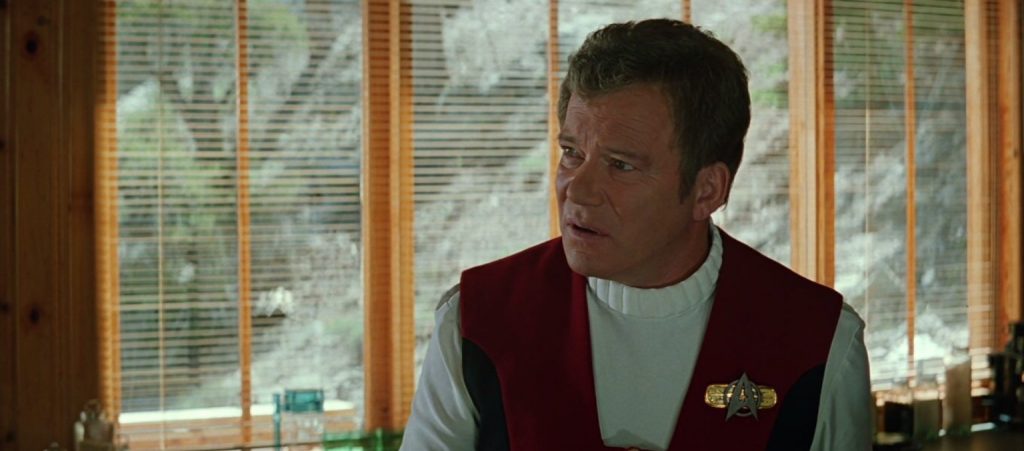
Many just see Generations as forcing the two captains on screen for the sake of it but there’s so much more to it than that. Take for example the first meeting of Picard and Kirk. Both are in the Nexus but Picard has become consciously aware of where he is and is now driven having realised he has a second chance to stop Soran from taking millions of innocent lives. Kirk is now in a very different place in his life both literally and figuratively. He is no longer driven by duty and his obligation to Starfleet. Now, having faced death and finally lost, he’s more contemplative of the cost that his career choices have had on his personal life. He tries to impart this newfound wisdom upon Picard, the two men playing very much the younger and older reflections of their respective selves. Picard is still driven by duty even though he’s been made fully aware that his devotion to a solitary life has cost him both a family and heirs to carry on the Picard line. Ultimately, what’s at the core of these two great men is their duty to save lives even though their mission may cost them their own. All this ties perfectly in to the film’s themes of life, death and mortality and, in his brief moment of doubt, we get to see a new dimension to Kirk that feels organic and in keeping with his recent experiences.
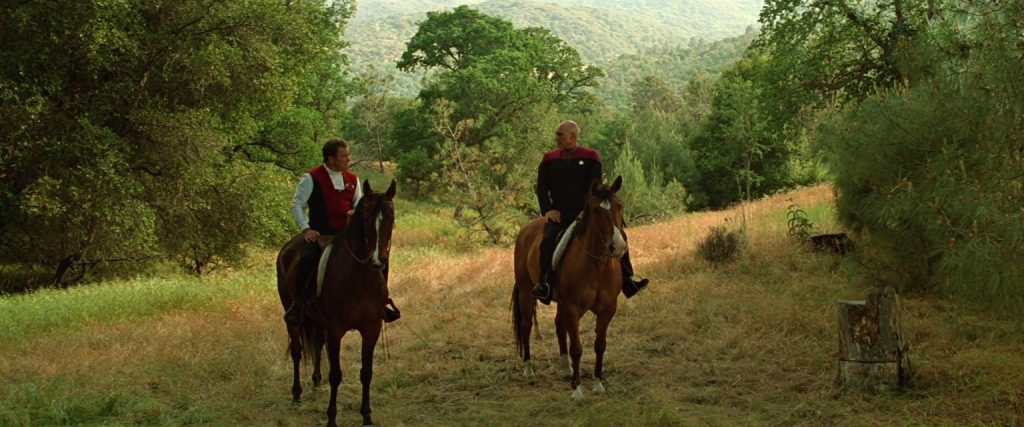 Yes, Generations is a blatant passing of the torch but it’s also a fitting send off for Kirk as his eventual death, whilst controversial back in 1994 and subject of a costly reshoot, is still very moving. Kirk’s last line, “Oh my!” was one that Shatner had himself devised as he felt that it suitably expressed the awe of Kirk’s reaction as he passed from this life into the next. Is Kirk’s death as moving as Spock’s in The Wrath of Khan? Certainly not. But when you consider that Spock is resurrected in the following film, it takes much of the impact out of what should be the defining moment in Star Trek.
Yes, Generations is a blatant passing of the torch but it’s also a fitting send off for Kirk as his eventual death, whilst controversial back in 1994 and subject of a costly reshoot, is still very moving. Kirk’s last line, “Oh my!” was one that Shatner had himself devised as he felt that it suitably expressed the awe of Kirk’s reaction as he passed from this life into the next. Is Kirk’s death as moving as Spock’s in The Wrath of Khan? Certainly not. But when you consider that Spock is resurrected in the following film, it takes much of the impact out of what should be the defining moment in Star Trek.
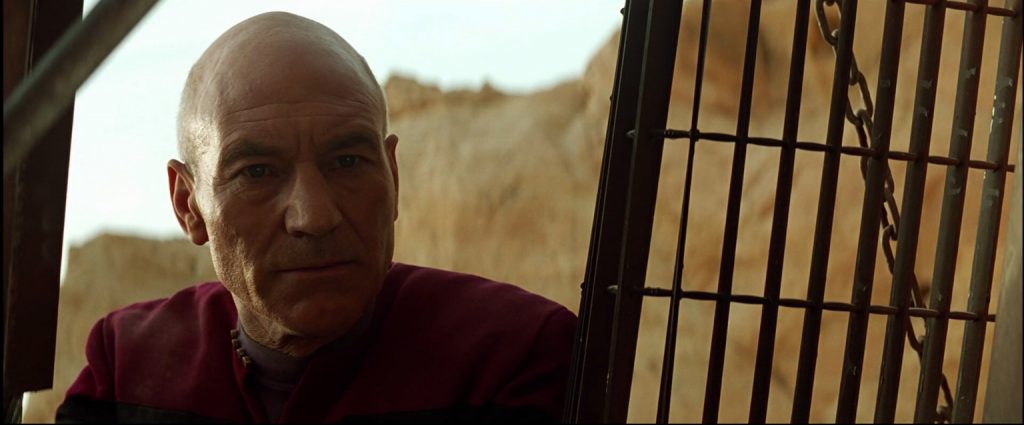 No discussion of Generations would be complete without mentioning Dennis McCarthy’s stunning score. The Star Trek cinematic outings have often benefitted from scores by the late and very great Jerry Goldsmith, but I regard McCarthy’s score for Generations as one of the most moving and fitting film scores I’ve heard. McCarthy weaves a stunning aural tapestry that perfectly suits the deep and philosophical themes of the film whilst also giving the action scenes the required tension and bombast. In concert with the superb editing, the score perfectly matches each and every cut, every visual cue with absolute precision and it’s one of my absolute favourite film scores.
No discussion of Generations would be complete without mentioning Dennis McCarthy’s stunning score. The Star Trek cinematic outings have often benefitted from scores by the late and very great Jerry Goldsmith, but I regard McCarthy’s score for Generations as one of the most moving and fitting film scores I’ve heard. McCarthy weaves a stunning aural tapestry that perfectly suits the deep and philosophical themes of the film whilst also giving the action scenes the required tension and bombast. In concert with the superb editing, the score perfectly matches each and every cut, every visual cue with absolute precision and it’s one of my absolute favourite film scores.
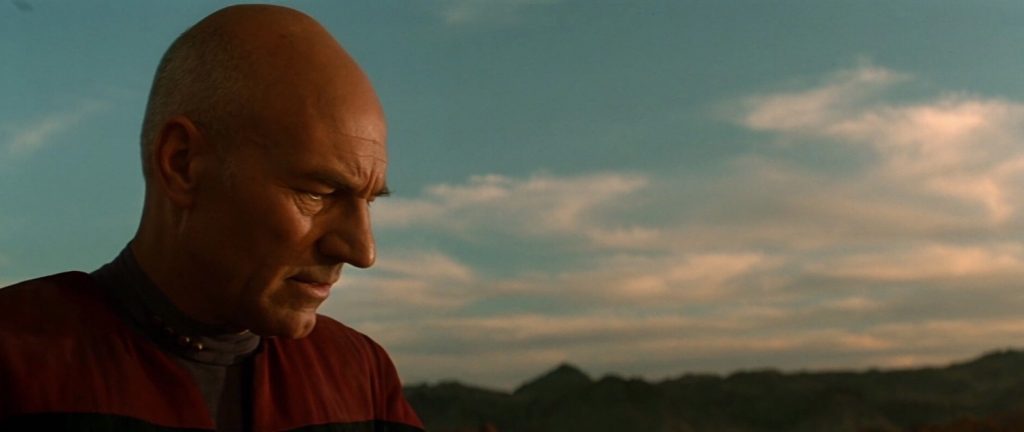
Generations may seem an odd pick for our first Star Trek retrospective given that we’ve not covered any of the other 12 Trek films but having seen last year’s Star Trek: Beyond, which didn’t exactly blow me away, it made me want to revisit what may well be my personal favourite Star Trek film. Yes, I’m aware that this won’t be a popular choice for many and I’m not saying for a second that Generations is as good a film as Star Trek II: The Wrath of Khan because it isn’t. Wrath of Khan is easily the best Star Trek film and one that I love dearly. It’s just that the themes of mortality that are so prevalent throughout Generations really struck a chord with me and I’ve loved the film since I first saw it in the cinema 22 years ago. It was the film that got me into Star Trek in a big way and one that I will continue to defend. It’s a beautifully profound and thought provoking lament on human mortality, and as much as Soran would remind us that time will eventually catch up with us and move in for the kill, the film ends on a point of optimism as Picard offers his own words of wisdom and reassurance…
“What we leave behind is not as important as how we’ve lived.”
Film ‘89 Verdict – 9/10

